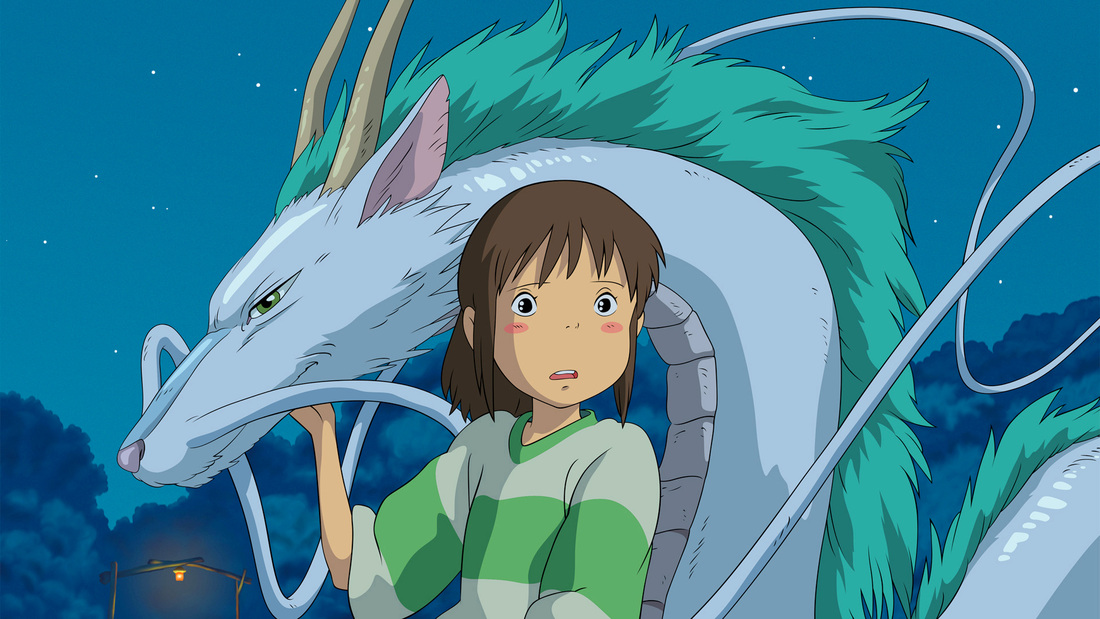-Roger Ebert
Genre: Fantasy
Creator: Hayao Miyazaki
Studio: Ghibli
Length: 124 minutes
Year: 2001
Highlights: Considered one of the greatest anime films ever.
I’m writing about it for all of those reasons, but also because it is not only one of my favorite anime films, but also one of my favorite films. Period.
Spirited Away is the story of a young girl named Chihiro. While on the way to move into a new house, her parents take a wrong turn and, in a moment of curiosity, wander into what they think is an abandoned theme park. Little do they know that they have actually entered the spirit world, and after foolishly chowing down on some spirit food, both of Chihiro’s parents are turned into pigs. A horrified Chihiro soon meets a dragon named Haku, who tells her that in order to stay in their world she must get a job at a bathhouse for the spirits run by a greedy witch named Yubaba. With the help of her coworker Lin, the elderly boiler-operator Kamaji, and the voiceless spirit called No-Face, Chihiro must find a way to rescue her parents and, in the process, grow up.
Spirited Away is a quintessential Miyazaki film with all of his trademarks. It is anchored by a strong female protagonist, specifically a child (Miyazaki considers himself a feminist, and it shows in that nearly all of his films have female leads). It has a sort of unique, dreamlike quality that I’ve never seen in the work of any other director. And it has absolutely gorgeous animation, which has become one of the primary marks of Miyazaki’s Studio Ghibli. In fact, he dislikes computers, and personally draws thousands of frames of each of his films by hand. The primary purpose of this Guide is to educate those in the ways of anime, and in the world of anime Hayao Miyazaki is a living legend.
Spirited Away is also an interesting study in contrasts. On the one hand, it’s a surreal fantasy film, with eerie spirits, bewitching spells, and more magic than any of Disney’s fairy tales; the film’s beautiful animation gives the spirit world a colorful, vibrant atmosphere that seems fantastic and otherworldly. It’s often called the Japanese equivalent of Alice in Wonderland, and for good reason. It’s a world that wouldn’t seem out of place with a Disney logo on the front of it (which is indeed the reason why Disney is the American distributor). In addition, the film has a fair amount of subtle commentary on the state of modern Japanese society, for those interested in such things.
But, on the other hand, Spirited Away is a profoundly real film. Despite all the magic and spirits, this film is fundamentally the story of Chihiro, and how she has to grow up. At the start of the film, she is whiny, bratty, and cowardly. But in order to rescue her parents and live in the spirit world, she has to mature. She has to learn to work hard, make friends, and above all, be brave. Along the way she has to face her fears, and she falls in love. She goes through the things that every person has to go through, and so, despite her fantastic circumstances, her story becomes a timeless, universal story of growing up. Perhaps this is why it has resonated so strongly with so many people all across the globe: it tells a universal story. I think the best films are ones that tell universal stories, and they are just as valid if they are made with flesh-and-blood actors or ones that are drawn.
In the end, I simply love Spirited Away. I love its enchanting animation, ranking up there with the best of any anime I’ve seen. I love Studio Ghibli, and specifically Hayao Miyazaki, one of my all-time favorite directors, for creating beautiful, magical worlds to lose myself in. But most of all, I love it because it is a film that crosses lines of culture and language in order to tell a story that means something to everyone. If you only ever watch one anime film in your life, do yourself a favor and let that one film be Spirited Away.

 RSS Feed
RSS Feed
